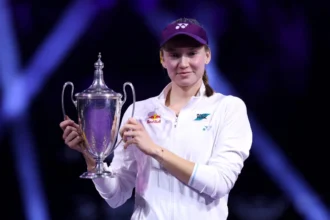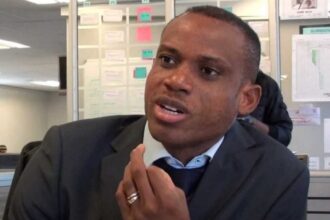BY ERNEST OSOGBUE
It was indeed great news when the statement from the presidency announcing the award of houses to members of the 1994 Super Eagles team was received. Before 1994, the Super Eagles had scored several near misses in the pursuit of a second AFCON title to no avail, leading to the team being derisively referred to as ‘Papa Eagles’ at one time.
An unsung coach from the Netherlands, Clemens Westerhof, arrived Nigeria unheralded, and changed the Nigerian footballing landscape with his brand of attacking football and mesmerized friends and foe alike. By 1994, the Super Eagles had taken the African continent by storm, bruising, badgering, and crushing opponents to submission whether at home, or away in the remotest parts of Africa.
At Algiers 1990 Africa Cup of Nations, despite losing the opening game woefully, the Super Eagles woke up from slumber to make it to the final, before losing 0-1 to the Desert Foxes of Algeria. In a campaign that had threatened to go off the hinges from the start, that Silver medal was seen as a great achievement, and was celebrated by Nigerians as if it were gold. By 1992 in Senegal however, the expectation was that the Eagles would go all the way, and end Nigeria’s wait for glory since the triumph on home soil in 1980. The Black Stars of Ghana however had different ideas. A memorable clash between Ghana and Nigeria in the semi-final was settled by a superb Abedi Pele glancing header, and a Prince Polley strike, to nullify Mutiu Adepoju’s header, and gift the Ghanaians a 2-1 win, consigning the Eagles to the Bronze medal play-off which they eventually won.
After the promise of the 1990 Silver medal, and the expectations surrounding the team, this Bronze medal was like a slap in the face of football lovers, and so the celebration of the 2-1 victory over the Indomitable Lions of Cameroun was muted. The Eagles were dismissed as a spent force that could never bring glory to the nation.
In all of these however, Clemens Westerhof remained upbeat, insisting that his team had the ingredients for greatness, as he received massive backing from the then military Vice President, the late Admiral Augustus Aikhomu. True to Westerhof’s optimism, by 1994, the exploits of the Eagles had become legendary across the African continent. The name Rashidi Yekini, the team’s goal machine, not only struck fear in the hearts of opponents, but made opposing defenders weak at the knees as teams surrendered to the superiority of the Eagles without shame.
The victory at the 1994 Africa Cup of Nations was therefore not a surprise to many, despite the emotional albeit feeble threat of the Chipolopolo’s of Zambia. Westerhof and his men have done the near impossible; from the ashes of the vilified ‘Papa Eagles’, Westerhof had resurrected the Green Eagles, and then transformed them to the Super Eagles. A grateful nation was in ecstasy, bowing and scraping at the feet of these illustrious sons. There was euphoria everywhere, and the political gloom palpable across the nation at the time, gave way momentarily, as Nigerians were bound together by the exploits of this glorious team.
In that euphoria, promises flew from all corners of the nation, both from the public and private sectors. It is now impossible to track how many of them were fulfilled, but here we are 27 years later and the Federal Government of Nigeria has finally fulfilled one promise.
While we may criticize the president in other fronts, in the arena of sports, especially in the keeping of promises to athletes, President Mohammadu Buhari deserves commendation. In January 2016 just a few months after taking office, he rewarded members of the 1985 U-16 National Team which won the inaugural World U-16 Championship, which later morphed into the FIFA U-17 World Cup. President Buhari had been Head of State at the time of the victory, but a putsch which forced a change in government soon after, prevented the fulfilling of his promise to the players. It took his coming back to government 31 years later for that promise to be kept.
While we celebrate the keeping of yet another promise by President Buhari, Nigerians are wondering why government promises, especially to sportsmen and women, and Nigerian youths in general take so long to manifest. Could this be one of the reasons why the youths never trust the government? A school of thought believes that this is why most Nigerian youths are reluctant to contribute positively to nation building. According to this group, when their contemporaries who labor to bring honor to the fatherland remain unrewarded for decades, even until some are in their graves, the youths become disillusioned.
It is generally believed that government is a continuum, and that the youth is the lifeblood of a nation. The exploits of the 1985 U-16 National Team was for Nigeria, why then did it take over 30 years, and the second coming of Buhari for the team to be rewarded? Similarly, Chioma Ajunwa, Nigeria’s first ever individual Olympic Gold Medalist, only just received her reward for a promise made since 1996. President Mohammadu Buhari therefore deserves commendation for reinforcing the age old adage that a promise is a debt.
Beyond that however, we must begin to ask the question of how youth engagement fits into the framework of governance in our country. In this wise, we must commend the Minister of Youth and Sports development, Mr. Sunday Dare for his recent incorporation of Nigerian youths in governance. The recent appointment of Mikel John Obi, and Odion Jude Ighalo to different portfolios are worthy of emulation. The minister must however look beyond the field of sports, and as well incorporate youths in the arts and entertainment, as well as in the sciences into governance. In this manner, Nigerian youths who form the bulk of the nation’s population would feel a sense of belonging in national affairs. It is a known fact that no nation can develop without the participation of its most active segment; the youth.
Finally, in more developed societies, there’s a clearly mapped out sports reward system, drawn up in a manner that even before athletes are called up, what is due them is known as a matter of policy. Our country must imbibe this trend, allowing individual whims to determine what comes to athletes is responsible for the chaotic situation we have on our hands. The Honorable Minister of Youth and Sports Development Chief Sunday Dare must as a matter of urgency, and in the effort to bequeath a lasting legacy to Nigerian sports, sponsor a bill to the national assembly on the importance of a National Sports Rewards Policy. This bill must detail what each athlete who represents Nigeria at different competitions, and at different levels of performance should get. This would ultimately streamline the performance and reward for athletes, away from the current haphazard and disjointed approach of promise and fail, which in most cases results in athletes receiving rewards long after they have died.









